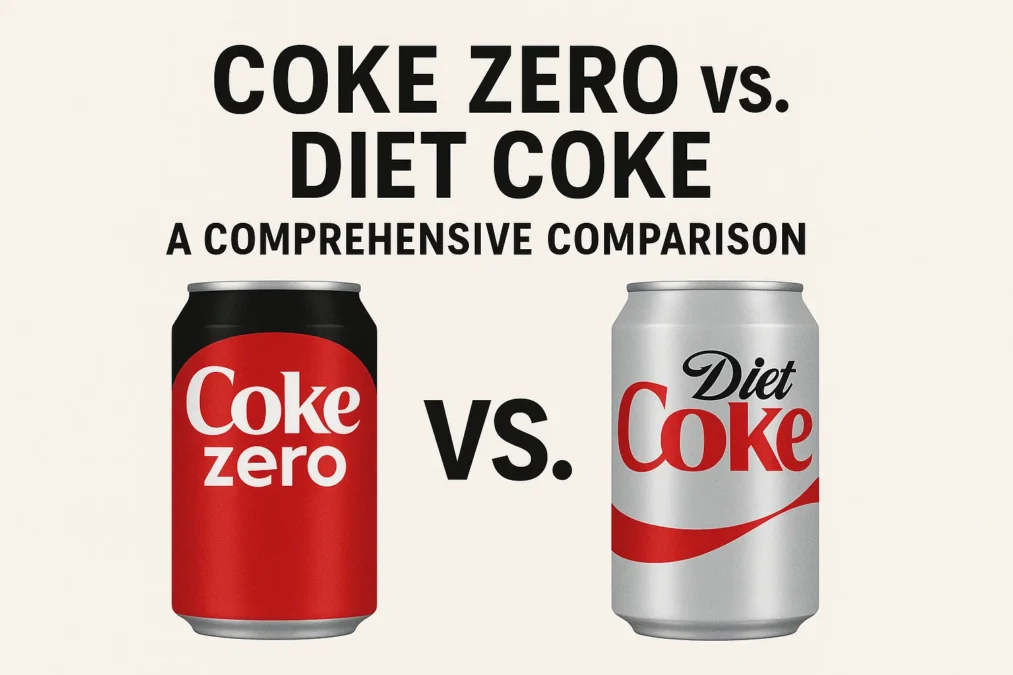Coke Zero vs Diet Coke: When it comes to zero-calorie sodas, Coke Zero and Diet Coke are two of the most popular options on the market. Both are marketed as healthier alternatives to regular Coca-Cola, but what exactly sets them apart? Are they just two sides of the same coin, or do they cater to different tastes and preferences? In this article, we’ll dive deep into the world of Coke Zero and Diet Coke, exploring their ingredients, nutrition facts, taste profiles, and more. Whether you’re a die-hard soda fan or just curious about the differences, this guide has got you covered.
Coke Zero vs Diet Coke: What’s the Difference?
At first glance, Coke Zero and Diet Coke might seem identical—both are sugar-free, calorie-free, and designed to mimic the taste of classic Coca-Cola. However, there are subtle differences in their ingredients, flavor profiles, and marketing strategies that set them apart.
The Origins of Diet Coke and Coke Zero
Diet Coke was introduced in 1982 as a revolutionary low-calorie soda. It quickly became a favorite among those looking to cut back on sugar without sacrificing the fizzy, refreshing experience of a cola. Diet Coke was marketed as a lighter, more modern alternative to regular Coke, and its success paved the way for other diet sodas.
Coke Zero, on the other hand, debuted in 2005 with a slightly different mission. While Diet Coke was designed to be a distinct product with its own unique flavor, Coke Zero aimed to replicate the taste of classic Coca-Cola as closely as possible—just without the sugar and calories. This distinction has led to a loyal fan base for both beverages, with some swearing by Diet Coke and others preferring Coke Zero.
Key Differences in Ingredients
Both Coke Zero and Diet Coke share many of the same ingredients, including carbonated water, caramel color, phosphoric acid, and aspartame. However, there are a few notable differences:
- Coke Zero contains potassium citrate and acesulfame potassium (Ace-K), which contribute to its slightly sweeter and more robust flavor.
- Diet Coke includes citric acid, which gives it a lighter, crisper taste.
These ingredient differences might seem minor, but they play a significant role in shaping the flavor profiles of the two sodas.
Coke Zero vs. Diet Coke Nutrition Facts
When it comes to nutrition, both Coke Zero and Diet Coke are virtually identical. They contain zero calories, zero sugar, and zero fat, making them popular choices for those watching their weight or managing their sugar intake.
Coke Zero Nutrition Facts
A 12-ounce (355 mL) serving of Coke Zero contains:
- Calories: 0
- Total Fat: 0g
- Sodium: 40mg
- Total Carbohydrates: 0g
- Total Sugars: 0g
- Protein: 0g
- Caffeine: 34mg
Diet Coke Nutrition Facts
A 12-ounce (355 mL) serving of Diet Coke contains:
- Calories: 0
- Total Fat: 0g
- Sodium: 40mg
- Total Carbohydrates: 0g
- Total Sugars: 0g
- Protein: 0g
- Caffeine: 46mg
As you can see, the nutritional profiles are nearly identical, with the only notable difference being the slightly higher caffeine content in Diet Coke.
Nigiri vs Sashimi: A Deep Dive into Japanese Culinary Delights
Coke Zero vs. Diet Coke: Which Tastes Better?
Taste is where the battle between Coke Zero and Diet Coke truly heats up. While both sodas aim to deliver the classic cola experience without the sugar, they achieve this in slightly different ways.
The Taste of Diet Coke
Diet Coke has a lighter, crisper flavor compared to regular Coca-Cola. Its use of citric acid gives it a tangy, refreshing quality that many people love. For some, Diet Coke’s taste is a nostalgic throwback to the 1980s, when it first hit the market as a groundbreaking diet soda.
The Taste of Coke Zero
Coke Zero, on the other hand, is designed to taste more like classic Coca-Cola. Its use of acesulfame potassium (Ace-K) alongside aspartame gives it a sweeter, more robust flavor that closely mimics the original. Many fans of Coke Zero appreciate its bold, full-bodied taste, which they feel is closer to the real thing.
Which One Wins?
Ultimately, the choice between Coke Zero and Diet Coke comes down to personal preference. If you prefer a lighter, tangier soda, Diet Coke might be your go-to. But if you’re looking for something that tastes more like classic Coke, Coke Zero is the way to go.
Coke Zero vs. Diet Coke: Which is Healthier?
Both Coke Zero and Diet Coke are marketed as healthier alternatives to regular soda, but are they really better for you? Let’s break it down.
Artificial Sweeteners: Aspartame and Acesulfame Potassium
Both sodas use aspartame as their primary sweetener, which is a calorie-free alternative to sugar. Coke Zero also includes acesulfame potassium (Ace-K), another zero-calorie sweetener. While these sweeteners are FDA-approved and considered safe for consumption, some people prefer to avoid them due to concerns about potential side effects, such as headaches or digestive issues.
Caffeine Content
Diet Coke contains slightly more caffeine than Coke Zero (46mg vs. 34mg per 12-ounce serving). While this difference is minimal, it might be a factor for those who are sensitive to caffeine or trying to limit their intake.
The Bottom Line on Health
Neither Coke Zero nor Diet Coke can be considered “healthy” in the traditional sense, as they both contain artificial sweeteners and offer no nutritional value. However, they are a better choice than regular soda if you’re looking to cut back on sugar and calories.
Coke Zero vs. Diet Coke: Tips for Cutting Back
If you’re looking to reduce your consumption of diet sodas, here are a few tips to help you make the switch:
- Try Flavored Sparkling Water: Brands like LaCroix and Bubly offer a wide range of flavored sparkling waters that provide the fizz without the artificial sweeteners.
- Experiment with Kombucha: This fermented tea is naturally fizzy and packed with probiotics, making it a healthier alternative to soda.
- Opt for Stevia-Sweetened Sodas: Brands like Zevia use stevia, a plant-based sweetener, to create zero-calorie sodas without artificial ingredients.
- Gradually Reduce Your Intake: If you’re a heavy soda drinker, try cutting back slowly by replacing one soda a day with water or another healthier option.
FAQs About Coke Zero and Diet Coke
1. Does Coke Zero or Diet Coke have more caffeine?
Diet Coke contains slightly more caffeine than Coke Zero (46mg vs. 34mg per 12-ounce serving).
2. Are Coke Zero and Diet Coke the same thing?
No, they have slightly different ingredients and flavor profiles. Coke Zero is designed to taste more like classic Coca-Cola, while Diet Coke has a lighter, crisper taste.
3. Which is healthier: Coke Zero or Diet Coke?
Neither is significantly healthier than the other, as both contain artificial sweeteners and offer no nutritional value. However, they are better choices than regular soda if you’re looking to cut back on sugar and calories.
4. Can I drink Coke Zero or Diet Coke while on a diet?
Yes, both sodas are calorie-free and can be included in a diet. However, it’s important to consume them in moderation and focus on whole, nutrient-dense foods for overall health.
Conclusion
Coke Zero and Diet Coke are two sides of the same coin—both are zero-calorie, sugar-free sodas designed to satisfy your cola cravings without the guilt. While they share many similarities, their differences in taste and ingredients make them unique. Whether you prefer the bold, classic flavor of Coke Zero or the light, tangy taste of Diet Coke, the choice ultimately comes down to personal preference.
If you’re looking to cut back on soda altogether, there are plenty of healthier alternatives to explore, from flavored sparkling waters to probiotic-rich kombucha. Whatever you choose, remember that moderation is key to maintaining a balanced and healthy lifestyle.
This article is designed to be informative, engaging, and optimized for search engines, ensuring it ranks well while providing valuable insights to readers.



